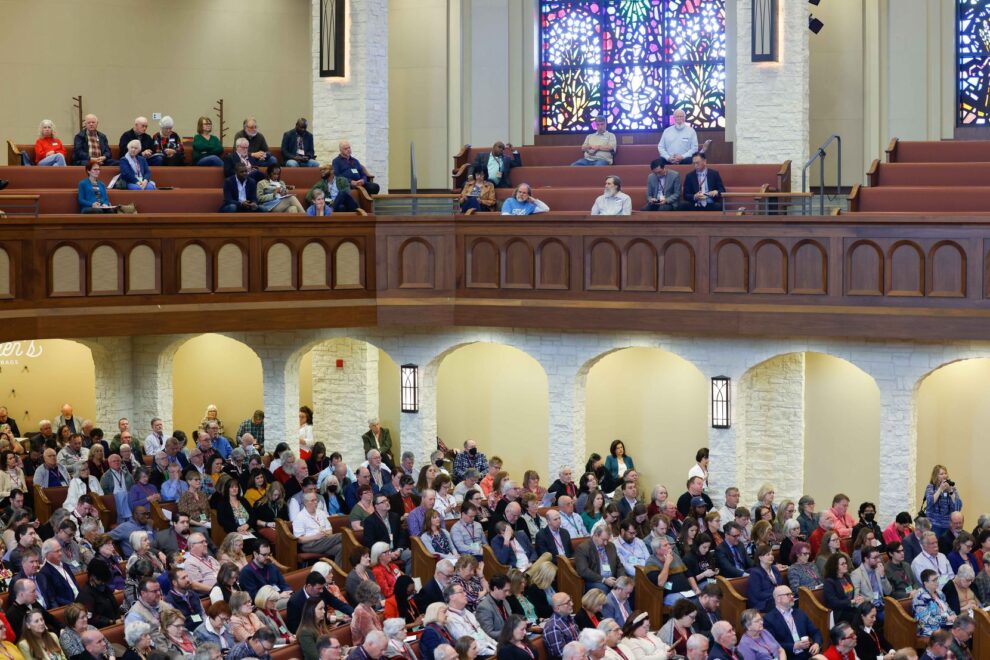At a special session Saturday in San Antonio, delegates of the Rio Texas Conference approved the departure of 33 churches from the United Methodist Church. The vote comes as thousands of other churches across the country have disaffiliated from the denomination, following years of internal disagreement over LGBTQ participation and ministry.
“Today several congregations decided they needed to leave The United Methodist Church. Although we do not desire anyone to leave, I wish nothing but God’s best for them,” Bishop Robert Schnase of the Rio Texas conference said in a news release.
After a stance against same-sex marriages and LGBTQ clergy members was upheld by a slim majority in 2019, conservative congregations across the country believe that decision is not being enforced and many are seeking to disaffiliate from the denomination.
Some, however, deny leaving over LGBTQ inclusion and point to a variety of conflicts with the broader denomination, from finances to theology.
Saturday’s special session vote, held at the University of Texas San Antonio, followed a long process for the 33 churches including a six-month discernment period and approval from the Conference’s board of trustees, according to the news release. The Rio Texas Conference, one of six that covers Texas, is part of the South Central Jurisdiction of the UMC. The conference spans South and parts of West and CentralTexas, and includes San Antonio, Austin and Corpus Christi.
The Conference, which had 350 churches before the vote, will meet for its regular annual conference June 8 in Corpus Christi. Another disaffiliation vote for additional churches is expected then.
The UMC is allowing churches to leave while retaining their properties and assets as long as certain steps are taken before the end of 2023, under a ruling established in 2019 called Paragraph 2553 of the Book of Discipline.
Local churches may split from the denomination for “reasons of conscience” regarding LGBTQ clergy and same-sex marriage, “or the actions or inactions of its annual conference related to these issues,” according to the guidance.
Congregations must first reach a two-thirds majority vote in favor of leaving before being approved by their annual conference. Churches must also pay two years of apportionments to the UMC as well as any unfunded pension liabilities.
“I am grateful that these congregations followed the process outlined by our conference trustees,” Schnase said. “We have reached the point in our spiritual journeys where we separate to walk different paths.”
After disaffiliation from the UMC, local churches could join other denominations or remain independent. For example, First Methodist Church of Irving recently joined the Global Methodist Church, a theologically conservative denomination that split from the UMC in May 2022.
What’s next for the UMC?
Every four years, the UMC hosts a gathering of its delegates from around the world at its General Conference. In 2019, a special session of the General Conference met in St. Louis to address the denomination’s stance on LGBTQ inclusion in the church.
In the end, a stance against same-sex marriages and ordination of LGBTQ clergy was upheld by a 53% vote, according to UM News.
The next regularly scheduled General Conference in 2020 was highly anticipated because of the division over LGBTQ clergy and same-sex marriages, but it was postponed multiple times because of the COVID-19 pandemic and won’t take place until 2024.
The North Texas Conference ratified the disaffiliation of 41 local churches in March. Out of any U.S. state, Texas has the most churches splitting from the UMC, according to data kept by The Tennessean. Two other Texas regional conferences lost about half of their churches in December.
About 2,500 of the UMC’s U.S. churches, or 8%, have disaffiliated, according to UM News. Taking Saturday’s vote into account, nearly 600 are from Texas.
Source: The Dallas Morning News
















